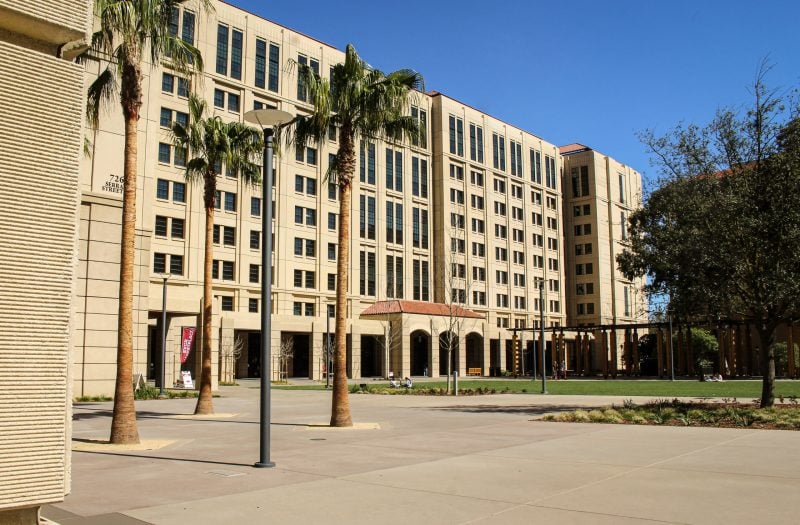The Graduate Student Council (GSC) swore in new members and received updates on the upcoming year’s housing lottery and dining hall meal plans during its July 11 meeting.
Kay Barrett, a first-year Ph.D. student in English Literature, was sworn in as a new GSC councilor by ASSU Vice-President Kyle Haslett ’25. She will serve as the Diversity and Advocacy Chair for the 2023-24 school year.
GSC councilors were also assigned roles by new co-chairs: Kristen Jackson, a third-year Ph.D. student in Education, and Elizabeth Park, a third-year Ph.D. student in Chemistry. The roles were decided based on applications submitted before the meeting.
Update on meal plans
Councilors asked Residential and Dining Enterprises (R&DE) to consider smaller five- and 10-block meal plans for graduate students in addition to the “popular” 25-block meal plan.
Eric Montell, an R&DE administrator and assistant vice provost for Stanford Dining and Hospitality, said there were difficulties in managing various meal plans in effect across undergraduate and graduate students while keeping them cost-effective.
“Mid-August, we’ll start with the new set of… meal plans and then [continue providing] the 25-block meal plan for grad students to be able to use,” Montell said.
The current set of meal plan options will expire on Aug. 31, while new meal plans are in the process of being added to the R&DE website for students to view. Meal plans expire after one year, Montell said.
In response to food affordability concerns raised by graduate students, Kahlil Wells, the senior associate director of meal plans, gave an overview of the graduate student food pantry.
The food pantry is hosted on the second Monday of each month behind EVGR Building C in partnership with Second Harvest food bank to provide additional food support to undergraduate and graduate students in need.
Although attendance decreases over the summer, 367 students attended the July 10 pantry and 409 showed up the previous month. Wells said they struggled with having sufficient volunteers after a few had to drop their roles last minute.
“The biggest way to support us is through recruiting volunteers. For that event, it is so crucial that it works smoothly, so we are able to do two lines in the morning when the lines are the busiest … and then we’ll have smooth sailing throughout,” Wells said.
Housing lottery
Justin Akers, the senior director for Student Housing Assignments, provided an overview of the housing priority lottery in April and May.
New incoming students are placed at the top of the lottery draw because they are guaranteed housing, Akers said. Then, prioritized housing is offered to students depending on their professional programs.
Ph.D. students are guaranteed six years of priority housing, while Masters students only receive one. After their years of priority housing are exhausted, students are moved to “low priority” tier, Akers said.
The previous housing lottery in 2022 provided housing to all new students and students in the “high or medium” priority tiers, compromised of graduate students who had priority years remaining. A fraction of “low priority” students were also granted a housing assignment if they were willing to live anywhere. Akers predicted that the 2023 housing lottery is shaping up to have similar results.
“Not everyone who participated in the lottery was assigned. That’s very normal. So we are now processing the second round for the people who have continued on with the process,” Akers said.
For students who were not assigned the first round and still need housing, Akers suggested they “stick with the process, continue to apply, rank all of the housing options on your application and you have a very good chance of being assigned eventually as we move through the process.”
A breakdown of GSC operations
ASSU Financial Manager Jas Espinosa ’18 M.A. ’19 spoke about the GSC functions under the ASSU and said a “culture change” is necessary in funding disbursement.
“We’re trying to change the culture that exists on campus of how students refer to the ASSU and particularly how they see ASSU money,” Espinosa said. “There’s been a sort of shift in culture where students aren’t necessarily aware of where the money comes from. And if they are, they either feel entitled to it, or there’s unethical practices when it comes to what is a fair and ethical use of your peers’ money.”
Espinosa said the ASSU is prioritizing offering curated training on ethics and compliance to its members.
The GSC is financially dependent on the ASSU, which is in charge of creating equitable funding guidelines to distribute grants. The GSC uses the funds they receive to support graduate Voluntary Student Organizations (VSOs) and host community events for graduate students.
Espinosa hopes to collaborate with the GSC to reconsider distinct funding guidelines for VSOs, which they said could be the root of various problems, including fraud concerns. Espinosa said fraud concerns may occur when VSOs have “clearly bloated” or report increased members on activity request applications from the previous year.
Espinosa said they intend to work on providing clearer funding guidelines for VSOs that are half undergraduate and half graduate students.
“Those are two big overarching goals that I personally have this year,” Espinosa said.
